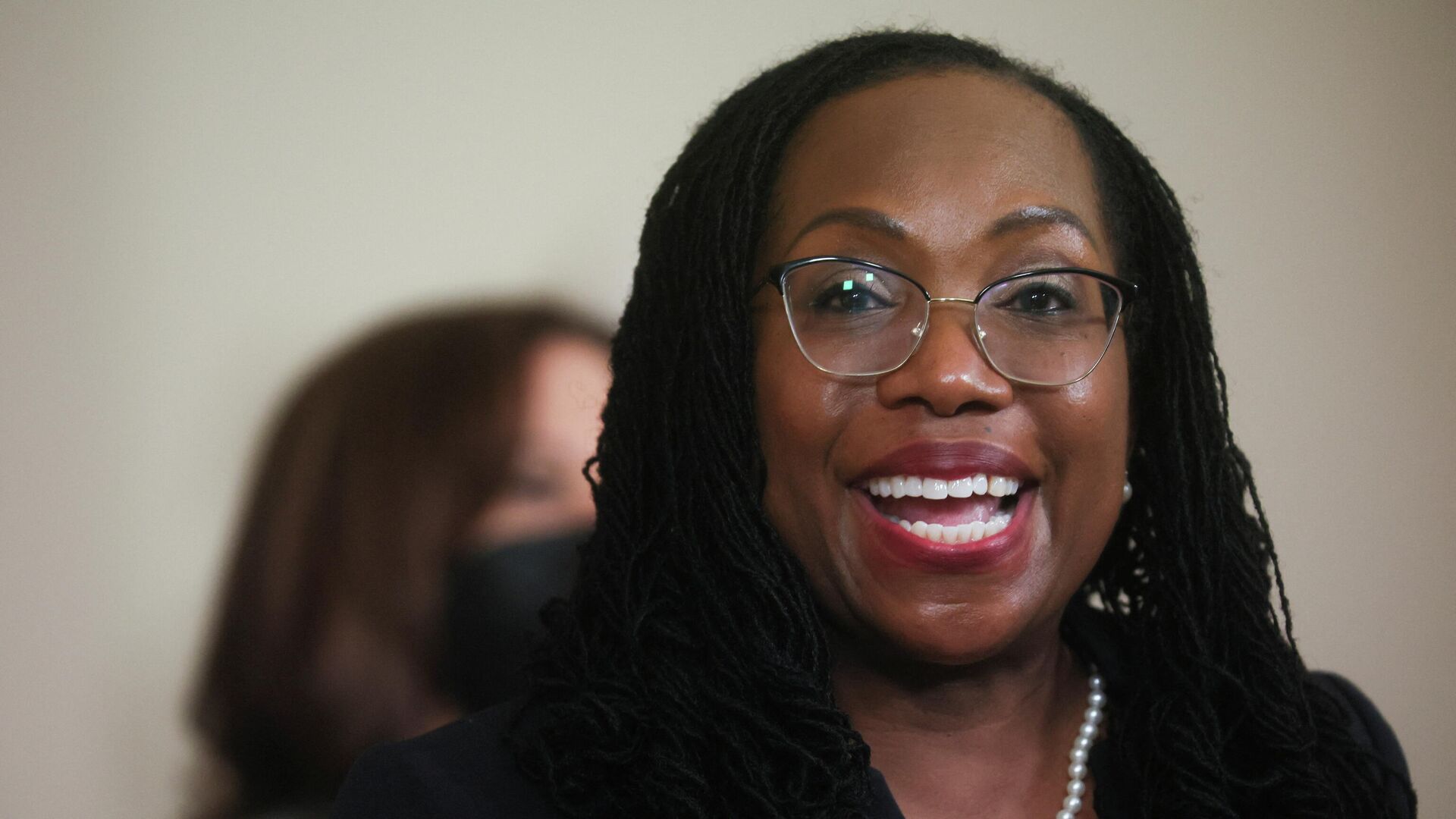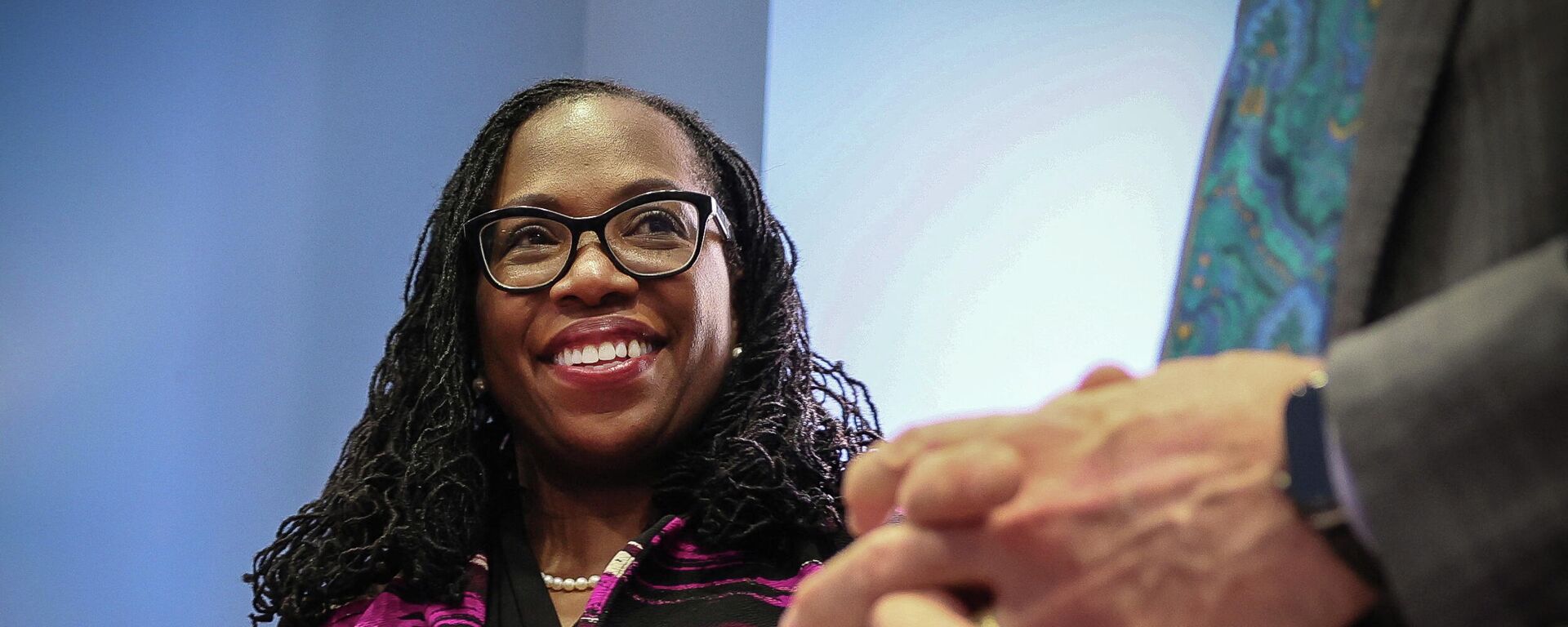https://sputnikglobe.com/20220323/im-not-a-biologist-bidens-supreme-court-pick-ducks-grilling-over-definition-of-the-word-woman-1094118244.html
'I'm Not a Biologist': Biden's Supreme Court Pick Ducks Grilling Over Definition of the Word 'Woman'
'I'm Not a Biologist': Biden's Supreme Court Pick Ducks Grilling Over Definition of the Word 'Woman'
Sputnik International
President Joe Biden's Supreme Court nominee Ketanji Brown Jackson - who makes history as the first Black woman nominated for the court, had appeared before the... 23.03.2022, Sputnik International
2022-03-23T13:29+0000
2022-03-23T13:29+0000
2022-03-23T13:29+0000
supreme court
ruth bader ginsburg
us
https://cdn1.img.sputnikglobe.com/img/07e6/02/1b/1093408962_0:0:3072:1728_1920x0_80_0_0_e05dd1f804db5b37acc7ffb2156ef383.jpg
Supreme Court nominee Ketanji Brown Jackson refused to define the word “woman” during the second day of her confirmation hearing, conducted by the US Senate's Judiciary Committee on Tuesday.Senator Marsha Blackburn (R-Tenn.) had resorted to a quote from late Supreme Court judge Ruth Bader Ginsburg as she pressed Jackson on sex and gender issues, saying:However, in response, Jackson claimed she had never heard the quote in question.“Can you define the word 'woman'?” she was then asked.The first Black woman being nominated for the court fired back with the question: “Can I provide a definition?” Only to then quip, “No, I can't… I'm not a biologist.”Blackburn slammed the fact that Jackson failed to provide a “straight answer about something as fundamental as what a woman is”. According to the senator, this was a glaring example of “the dangers of the kind of progressive education that we are hearing about.”At this point in the grilling, Blackburn referenced the recent victory of biological male swimmer Lia Thomas in the NCAA championships against female competitors.“Just last week, an entire generation of young girls watched as our taxpayer-funded institutions permitted a biological man to compete [against] and beat a biological woman in the NCAA women's swimming championships,” said the senator, asking:Jackson appeared intent to shy away from any direct answer, conceding that the “legal issues” in question were being “hotly discussed” and “could come to the Court, so I'm not able to address them.”As to the “progressive education” lambasted by the senator earlier in the exchange, it referred to questioning that Republican Sen. Ted Cruz (R-Texas) had subjected Jackson to.Cruz had steered the conversation towards the controversial critical race theory, whose tenets are based on “systemic racism” and “white privilege.”CRT, which originated in the 1960s is rooted in the idea that race is not a natural and biologically grounded feature, but a socially constructed category, wielded to exploit people of colour.Specifically, the theory argues that US laws and legal institutions are "inherently racist" and function to create and maintain social, economic, as well as political inequalities between whites and non-whites, most notably black people.Cruz had pressed the nominee for her views on CRT, as he brandished a stack of books on racism, such as “Antiracist Baby” and “The End of Policing”, acceptable on the reading list at Georgetown Day School. Jackson serves on the board of this private school in Washington, DC.As Cruz quoted from “Antiracist Baby”, which says that “babies are taught to be racist or antiracist, there is no neutrality,” he asked whether Jackson agreed with the tome in question being used to teach children.Harvard-educated Jackson, who boasts experience as a public defender, district judge and court of appeals judge, had faced a second day of grilling by senators focused on issues of race, abortion and judicial philosophy.In another section of questioning, throwing into focus policing and crime, Jackson was asked by Cruz, Blackburn and Sen. Josh Hawley why she gave child pornography criminals “substantially” more lenient sentences than what the prosecutor demanded, in what was seen as an “alarming pattern”.“I take these cases very seriously as a mother. A judge has to review the actual evidence in these cases and based on Congress' requirement, take into account not only the sentencing guidelines, not only the recommendations of the parties, but also things like the stories of the victims,” said the nominee. Jackson promised that she always put the harm done to victims of child sex offenders at the forefront of her sentencing decisions.Earlier, the White House dismissed concerns raised by Hawley and other Republicans regarding Joe Biden’s Supreme Court nominee, with WH press secretary Jen Psaki accusing the GOP of a “last-ditch, eve-of-hearing desperation attack on her record”.Let's stay in touch no matter what! Follow our Telegram channel to get all the latest news: https://t.me/sputniknewsus
https://sputnikglobe.com/20220321/virginia-tech-swimmer-slams-ncaa-transgender-policy-in-emotional-letter-1094046678.html
https://sputnikglobe.com/20220322/biden-supreme-court-pick-dismisses-gop-claims-she-gave-child-porn-offenders-light-sentences-1094094385.html
Sputnik International
feedback@sputniknews.com
+74956456601
MIA „Rossiya Segodnya“
2022
News
en_EN
Sputnik International
feedback@sputniknews.com
+74956456601
MIA „Rossiya Segodnya“
Sputnik International
feedback@sputniknews.com
+74956456601
MIA „Rossiya Segodnya“
supreme court, ruth bader ginsburg, us
supreme court, ruth bader ginsburg, us
'I'm Not a Biologist': Biden's Supreme Court Pick Ducks Grilling Over Definition of the Word 'Woman'
President Joe Biden's Supreme Court nominee Ketanji Brown Jackson - who makes history as the first Black woman nominated for the court, had appeared before the Senate Judiciary Committee on Tuesday for the second day of her confirmation hearing
Supreme Court nominee Ketanji Brown Jackson refused to define the word “woman” during the second day of her confirmation hearing, conducted by the US Senate's Judiciary Committee on Tuesday.
Senator Marsha Blackburn (R-Tenn.) had resorted to a quote from late Supreme Court judge Ruth Bader Ginsburg as she pressed Jackson on sex and gender issues, saying:
“Physical differences between men and women are enduring. The two sexes are not fungible. A community made up exclusively of one sex is different from a community composed of both… Do you agree with Justice Ginsburg that there are physical differences between men and women that are enduring?”
However, in response, Jackson claimed she had never heard the quote in question.
“Can you define the word 'woman'?” she was then asked.
The first Black woman being nominated for the court fired back with the question: “Can I provide a definition?” Only to then quip, “No, I can't… I'm not a biologist.”
Blackburn slammed the fact that Jackson failed to provide a “straight answer about something as fundamental as what a woman is”. According to the senator, this was a glaring example of “the dangers of the kind of progressive education that we are hearing about.”
At this point in the grilling, Blackburn referenced the recent victory of biological male swimmer
Lia Thomas in the NCAA championships against female competitors.
“Just last week, an entire generation of young girls watched as our taxpayer-funded institutions permitted a biological man to compete [against] and beat a biological woman in the NCAA women's swimming championships,” said the senator, asking:
“What message do you think this sends to girls?”
Jackson appeared intent to shy away from any direct answer, conceding that the “legal issues” in question were being “hotly discussed” and “could come to the Court, so I'm not able to address them.”
As to the “progressive education” lambasted by the senator earlier in the exchange, it referred to questioning that Republican Sen. Ted Cruz (R-Texas) had subjected Jackson to.
Cruz had steered the conversation towards the controversial critical race theory, whose tenets are based on “systemic racism” and “white privilege.”
CRT, which originated in the 1960s is rooted in the idea that race is not a natural and biologically grounded feature, but a socially constructed category, wielded to exploit people of colour.
Specifically, the theory argues that US laws and legal institutions are "inherently racist" and function to create and maintain social, economic, as well as political inequalities between whites and non-whites, most notably black people.
Cruz had pressed the nominee for her views on CRT, as he brandished a stack of books on racism, such as “Antiracist Baby” and “The End of Policing”, acceptable on the reading list at Georgetown Day School. Jackson serves on the board of this private school in Washington, DC.
“I´ve never studied critical race theory. It doesn't come up in the work that I do as a judge,” Jackson told Cruz.
As Cruz quoted from “Antiracist Baby”, which says that “babies are taught to be racist or antiracist, there is no neutrality,” he asked whether Jackson agreed with the tome in question being used to teach children.
“I do not believe that any child should be made to feel as though they are racist or though they are not valued or though they are less than, that they are victims, that they are oppressors, I don't believe in any of that,” Joe Biden’s Supreme Court nominee responded.
Harvard-educated Jackson, who boasts experience as a public defender, district judge and court of appeals judge, had faced a second day of grilling by senators focused on issues of race, abortion and judicial philosophy.
In another section of questioning, throwing into focus policing and crime, Jackson was asked by Cruz, Blackburn and Sen. Josh Hawley why she gave child pornography criminals “substantially” more lenient sentences than what the prosecutor demanded, in what was seen as an “alarming pattern”.
“I take these cases very seriously as a mother. A judge has to review the actual evidence in these cases and based on Congress' requirement, take into account not only the sentencing guidelines, not only the recommendations of the parties, but also things like the stories of the victims,” said the nominee. Jackson promised that she always put the harm done to victims of child sex offenders at the forefront of her sentencing decisions.
Earlier, the White House dismissed concerns raised by Hawley and other Republicans regarding Joe Biden’s Supreme Court nominee, with WH press secretary Jen Psaki accusing the GOP of a “last-ditch, eve-of-hearing desperation attack on her record”.
Let's stay in touch no matter what! Follow our Telegram channel to get all the latest news: https://t.me/sputniknewsus 


